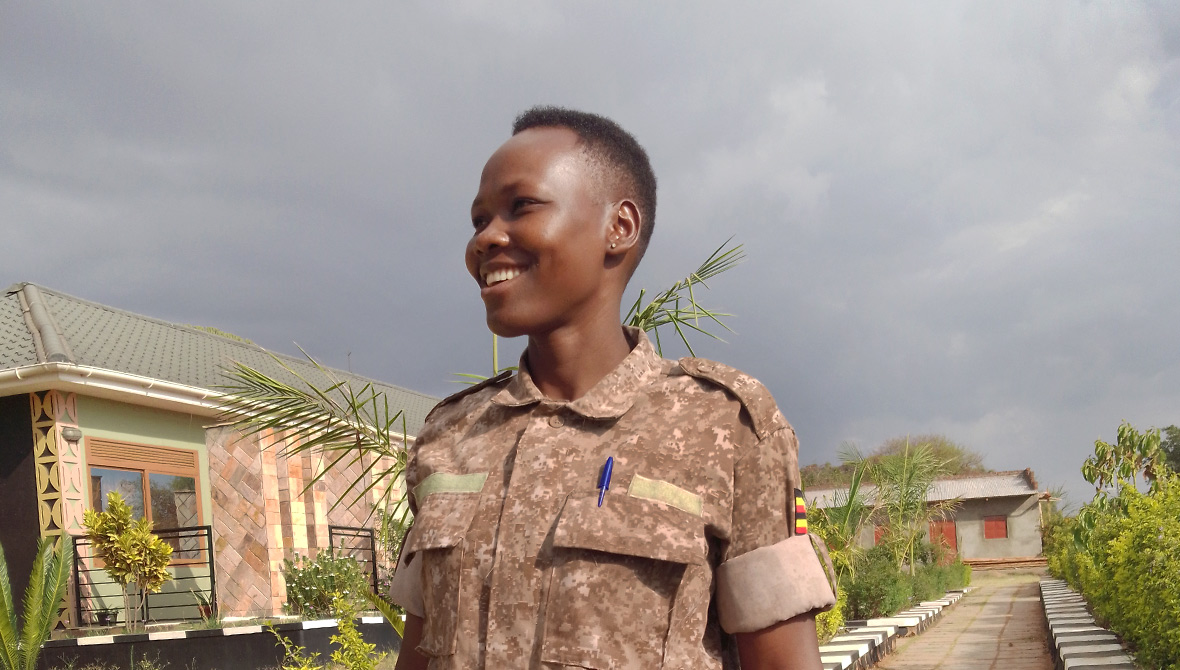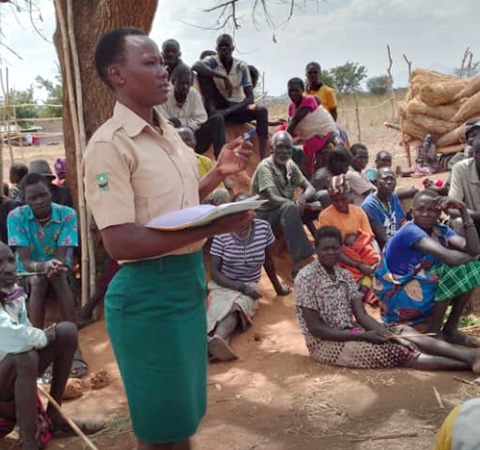Meet a teacher-turned-ranger helping her community co-exist with wildlife

UWA community conservation ranger Evaline Adei Ayepa supports human-wildlife conflict mitigation and community conservation in the Kidepo landscape
Evaline Adei Ayepa is a Uganda Wildlife Authority (UWA) community conservation ranger born and raised in Moroto district in Karamoja, northern Uganda. Growing up, she desired to be a teacher, and until 2015 taught grade three students at a school in the region. But she continued to witness the rampant illegal killing of wildlife, sparking her decision to join the ranks of UWA rangers in the Kidepo landscape. Evaline was determined to cause a shift in her community — she figured the wildlife offenders would refrain from crime if one of their own was leading by example and conserving biodiversity.
Kidepo is located in the distant northeast of Uganda, close to the borders of South Sudan and Kenya. It is an enthralling landscape of semi-arid savanna, seasonal rivers, and low mountains, home to an immense wealth of wildlife in the Kidepo Valley National Park.
Wildlife in Kidepo, like many other savanna landscapes in Africa, roams out of protected areas and crosses into community lands. The 1,442 sq.-kilometer landscape is especially isolated and stands out as an essential ecosystem in Uganda. However, it faces intense pressure from well-armed poaching syndicates with a long history of armed warfare.
The transboundary landscape also takes in a large influx of pastoralists, making human-wildlife conflict inevitable. This interface puts the livelihoods and lives of people in these communities at stake, and sometimes, wild animals are lost in retaliation for attacks. While local communities adjacent to protected areas face the heat of this conflict, they also play a critical role in ensuring peace, stability, and harmonious co-existence through community conservation, an approach that has been employed in Uganda since the 1990s.
African Wildlife Foundation (AWF) puts communities at the heart of conservation and believes conservation cannot thrive without sensitizing communities about the need to conserve wildlife and their habitats. To foster this co-existence, AWF supports UWA and local communities in protecting and managing essential ecosystems by designing and delivering creative nature-based solutions for people and wildlife to beneficially share these increasingly scarce resources.
Celebrating community conservation rangers
Ahead of World Ranger Day on July 31, 2023, we shine a light on AWF and UWA’s shared mission of rearing the community’s ownership of Uganda’s wildlife heritage. Community conservation rangers are the unsung leaders urging their compatriots to conserve wildlife and co-exist in Uganda’s wild lands. The community conservation department that oversees this landscape comprises 15 rangers.
Evaline is one of the three women UWA rangers in the squad. As a community conservation ranger, she is well known for de-escalating conflicts with aggrieved communities in the Kidepo landscape and carries out other duties in her essential role.
When Evaline graduated as a UWA ranger in January 2016, she worked tooth and nail to curb poaching for a year. It was only when she was deployed as a community conservation ranger that her thirst to be a change maker in her community was finally quenched.
“I joined the ranger force with an aim to teach my kindred in the region to stop poaching because some didn’t know it was bad while others were just addicted to the vice. Being in law enforcement, however, didn’t satisfy my desire. My craving was to impart knowledge and change mindsets and in turn curb the illegal killing of wildlife. My senior assigning me to the community conservation department was an answered prayer, and this is what I have lived for since,” Ayepa recounts with cheer.

Evaline Adei Ayepa educates communities on the benefits of wildlife conservation
Thanks to her job, the mother of two can send both her daughters to boarding school. Luckily, her children and husband understand the round-the-clock nature of her work. All year, Evaline is engaging community members, aiding anti-poaching campaigns, collecting data on human-wildlife conflict, and holding revenue-sharing meetings, among other roles.
Human-wildlife conflict peaks in certain months, keeping Evaline on her toes. She must assess crop damage caused by problem animals, take human-wildlife conflict victims to hospital for further management, or sometimes attend burials where lives are lost.
“I have to de-escalate the flaring anger of the aggrieved communities and also abate retaliatory killings of wildlife. Sometimes police accompany me for safety in case the hostility can’t be curtailed,” said Evaline.
She recalls a dreadful and unforgettable incident. “I received a phone call from a community member in Loleya notifying me of a dead elephant and that I must go immediately and collect the carcass. We rushed to the scene only to realize that an elephant had brutally attacked and killed a woman. Scary as the scene was, I talked and calmed the angry mob back to sanity.” Despite these incidents, Evaline continues to put her foot forward and is excelling at it.
Holistic approaches to mitigate human-wildlife conflict
Apart from building the capacity of 80 community wildlife scouts in community-based measures such as using chili bricks to deter elephants and equipping them with assorted items to mitigate human-wildlife conflict, AWF holds conservation education activities in its two Classroom Africa schools in the Kidepo Valley landscape.
Evaline has been pivotal in delivering impactful lessons to young minds. “It is very fulfilling to create awareness of the wildlife and ecosystem and how to co-exist in the landscape. Also, these children become agents of change for their parents in case they are involved in poaching. In some seasons with fewer crop damage cases, I usually talk to young people about the dangers that await them when their parents get arrested for poaching. The impact of these sessions will be tremendous because they are raising very aware and informed generations,” she explained.
Evaline became a ranger because of her love for conserving wildlife and her zeal to impart knowledge. She longs to see serial poachers denounce the vice and urges more women to join the force and shift the attitudes and mindsets of their communities towards conservation. She pondered, “My teaching profession still lives in my work as a ranger. It gives me much pleasure to impart knowledge to all demographics in the landscape.”
Wildlife in Kidepo spends 50 percent of its time out of the park. AWF, through its people-centered conservation approach, works with communities and private landowners for land-use planning. By collaborating to secure prime wildlife habitats and safeguard the park’s ecological integrity, communities generate income through conservation-friendly economic activities. As communities realize the benefits of conservation and improved welfare, they become stronger advocates for protecting biodiversity, just like Evaline.